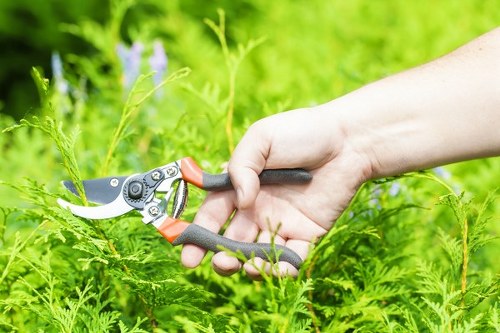Essential Garden Maintenance Services in Newham
Introduction to Garden Maintenance

Maintaining a beautiful garden in Newham requires regular care and attention. Whether you have a small urban garden or a spacious backyard, proper maintenance ensures your outdoor space remains vibrant and inviting throughout the year.
Garden maintenance involves a variety of tasks, including pruning, weeding, lawn care, and seasonal planting. By staying on top of these responsibilities, you can prevent common garden issues and promote healthy plant growth.
In this article, we will explore the key aspects of garden maintenance in Newham, offering tips and strategies to keep your garden in top condition.
Understanding Newham's Climate

Newham experiences a temperate climate with mild winters and warm summers, making it suitable for a wide range of plants. Understanding the local weather patterns is crucial for effective garden maintenance.
Spring in Newham brings increasing temperatures and longer daylight hours, perfect for planting new flowers and vegetables. Summer requires regular watering and pest control to keep plants thriving.
Autumn is the time for preparing your garden for the colder months, including leaf removal and protecting sensitive plants from frost.
Regular Lawn Care

A well-maintained lawn is the foundation of any beautiful garden. Regular lawn care in Newham includes mowing, fertilizing, and aerating to ensure healthy grass growth.
Mowing your lawn at the correct height promotes dense and vigorous grass. Fertilizing adds essential nutrients, while aerating helps alleviate soil compaction and improves water infiltration.
Additionally, dethatching can remove excess organic material, allowing air, water, and nutrients to reach the grass roots more effectively.
Pruning and Trimming

Pruning and trimming are essential for maintaining the shape and health of your plants. Regular pruning encourages growth, removes dead or diseased branches, and enhances the overall appearance of your garden.
Different plants require different pruning techniques. For instance, flowering shrubs may need pruning immediately after blooming, while fruit trees are best pruned in late winter.
Using the right tools and techniques ensures that plants are not damaged during the pruning process, promoting long-term vitality.
Weed Control Strategies

Weeds compete with your plants for nutrients, water, and sunlight, making effective weed control a critical aspect of garden maintenance.
Manual removal is an eco-friendly method, but it can be time-consuming for larger gardens. Mulching is another effective strategy, as it suppresses weed growth while retaining soil moisture.
Chemical weed killers should be used with caution, ensuring they do not harm desirable plants or the surrounding environment.
Seasonal Planting Tips
Choosing the right plants for each season ensures a vibrant and colorful garden all year round. Spring is ideal for planting annuals and vegetables, while summer favors perennials that can withstand heat.
Autumn is perfect for planting bulbs and preparing perennials for winter. Understanding the planting cycles helps in planning and maintaining a diverse and resilient garden.
Additionally, rotating crops and diversifying plant species can prevent soil depletion and reduce pest infestations.
Watering Techniques
Proper watering is vital for plant health. Overwatering can lead to root rot, while underwatering can cause plants to wilt and die.
Implementing efficient watering techniques, such as drip irrigation or soaker hoses, ensures that water is delivered directly to the roots, minimizing evaporation and waste.
Timing is also important; watering early in the morning reduces the risk of fungal diseases and ensures plants have adequate moisture throughout the day.
Pest and Disease Management
Regular monitoring for pests and diseases helps in early detection and treatment. Integrated pest management (IPM) combines biological, cultural, and chemical practices to control pests sustainably.
Encouraging beneficial insects, such as ladybugs and bees, can naturally reduce pest populations. Additionally, maintaining plant health through proper care makes them more resistant to diseases.
When necessary, use organic or targeted pesticides to minimize environmental impact.
Soil Health and Fertilization
Healthy soil is the foundation of a thriving garden. Regularly testing soil pH and nutrient levels helps in determining the appropriate fertilizers and amendments needed.
Adding compost or organic matter improves soil structure, enhances nutrient availability, and promotes beneficial microbial activity.
Choosing the right type of fertilizer, whether organic or synthetic, supports balanced plant growth and minimizes the risk of nutrient runoff.
Mulching for Garden Health
Mulching offers numerous benefits, including moisture retention, temperature regulation, and weed suppression. It also enhances the visual appeal of your garden beds.
Organic mulches, such as bark, straw, and compost, enrich the soil as they decompose. Inorganic mulches, like gravel or plastic sheeting, can be used for specific applications but do not improve soil fertility.
Applying mulch at the appropriate depth ensures maximum benefits without hindering plant growth.
Garden Tool Maintenance
Maintaining your garden tools in good condition makes garden maintenance tasks easier and more efficient. Regular cleaning, sharpening, and proper storage extend the lifespan of your tools.
Inspect tools for any damage before use to ensure safety and effectiveness. Investing in high-quality tools can also improve your gardening experience.
Organizing your tools and keeping them readily accessible saves time and reduces frustration during maintenance tasks.
Landscape Design and Planning
A well-designed garden not only looks beautiful but also functions efficiently. Planning your garden layout involves considering factors such as sunlight, soil type, and plant compatibility.
Incorporating elements like pathways, seating areas, and water features can enhance the usability and aesthetic appeal of your garden.
Regularly reviewing and updating your garden design ensures that it continues to meet your needs and adapts to changing conditions.
Eco-Friendly Gardening Practices
Adopting eco-friendly gardening practices promotes sustainability and reduces your environmental footprint. This includes using native plants, conserving water, and minimizing chemical use.
Composting kitchen and garden waste recycles nutrients back into the soil, while rainwater harvesting systems can provide an alternative water source for your garden.
Choosing environmentally responsible products and methods ensures that your garden supports local ecosystems and biodiversity.
Hiring Professional Garden Maintenance Services
While DIY garden maintenance is possible, hiring professional services can save time and ensure high-quality results. Professional gardeners in Newham have the expertise and equipment to handle complex maintenance tasks.
They can provide tailored solutions based on your garden's specific needs, from landscape design to seasonal planting and pest management.
Investing in professional maintenance services enhances the beauty and functionality of your garden, allowing you to enjoy a well-kept outdoor space without the stress of upkeep.
Conclusion
Effective garden maintenance in Newham involves a combination of regular care, strategic planning, and sustainable practices. By understanding the local climate, maintaining soil health, controlling pests, and implementing efficient watering techniques, you can foster a thriving and beautiful garden.
Whether you choose to maintain your garden yourself or hire professional services, consistent attention to these essential aspects will ensure your garden remains a source of pride and enjoyment for years to come.
Don’t wait to transform your garden into a stunning oasis—contact us today to book your garden maintenance service and let the experts help you achieve the garden of your dreams.

